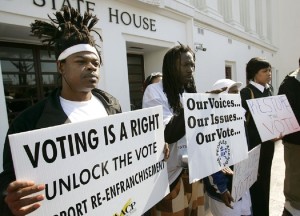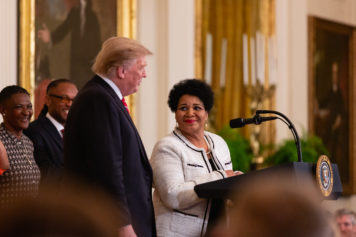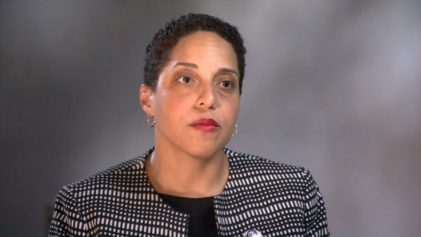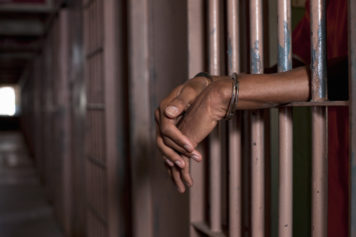
Rob Carr/Associated Press
President Obama has made criminal justice reform and the dismantling of the prison-industrial complex his defining legacy. But apparently, America’s system of Jim Crow is not an easy thing to undo overnight, and we are reminded of the stranglehold that mass incarceration has on the nation. Thousands who should not be there still remain in prison. Millions of people who served time in prison — disproportionately Black — are still denied the right to vote because of felony disenfranchisement laws. This is happening in the country of the imprisoned — a nation of 2.2 million inmates, the most incarcerated in the world, whether per capita or in absolute numbers.
Nearly 6 million people in America are barred from voting due to state-level felony disenfranchisement laws that do not permit people with a felony record to vote. This is a legacy of Jim Crow laws that were meant to keep Black people politically disempowered. And according to Democracy Now!, Florida has the greatest number of disenfranchised voters. In the Sunshine state, 10 percent of adults — and nearly one in four Black adults — cannot exercise the right to vote. Democracy Now! recently spoke with Desmond Meade, a disenfranchised ex-offender who is president of the Florida Rights Restoration Coalition and chair of Floridians for a Fair Democracy.
According to Meade, a problem arises when politicians decide who gets to vote and who does not, with the results falling along partisan lines. He is involved in an effort to do away with the felony disenfranchisement law in Florida.
“Right now in the state of Florida, an individual will have to wait either five or seven years before — after completing their sentence — before they’re even allowed to just apply,” he told Amy Goodman of Democracy Now! “And then, once they apply, we’re seeing application processing times of eight to 10 years. And so, you have an individual, an American citizen, waiting over 17 years, after he has completed his sentence, after he has repaid his debt to society, but yet he still cannot achieve citizenship status. And that is a blow against democracy.”
And the formerly incarcerated citizen noted that in the state of Florida, it is “extremely easy” to find oneself with a felony conviction.

Meade, who had a drug addiction in years past that led him in and out of jail, pleaded guilty to the charges against him and did not realize the collateral consequences of a felony conviction. Now, as his wife, Sheena Meade, runs for the Florida House of Representatives, he is unable to vote for her.
And looking on the national level, the Obama administration announced the most ambitious clemency program in four decades, in which thousands of imprisoned drug offenders and others were invited to seek early release. As a harsh critic of U.S. sentencing policies that take a toll on people of color, the president has commuted more sentences than his five predecessors combined. However, with nearly two years since the program began, there is a deluge of unprocessed clemency cases, as Reuters reported.
Of more than 44,000 federal inmates who have applied, over 8,000 cases have not yet been reviewed by the U.S. Department of Justice. In addition, there are 9,000 cases still pending at the Justice Department. This news comes as only 187 prisoners have had their sentences commuted, far fewer than the thousands that supporters for criminal justice reform would have hoped for. At present, pro bono lawyers are vetting the cases — including more than 570 law firms and 30 law schools — and now the DOJ is asking these lawyers to hand over the remaining cases to them without a vetting process. Critics blame the administration for the logjam and for not assigning the vetting process to the feds in the first place. In addition, 25,000 of 34,000 applications received were rejected for not meeting the guidelines for consideration, which include no record of violence, no significant ties to a gang or drug cartel, completion of at least 10 years of a sentence and good behavior while serving time.
The clemency program ends in January with the changing of the guard at the White House, and the administration indicated that it wants to decide on all clemency applications before that time. According to Reuters, one source believes as many as 1,500 people are eligible for commutation, so the progress that has been made so far is a drop in the bucket.
Meanwhile, according to the U.S. Sentencing Commission, federal life sentences have decreased in the Obama era, from 280 in 2009 to 153 in 2013. Most of these were for nonviolent crimes, and three-quarters of those sentenced to federal life were prisoners of color.


